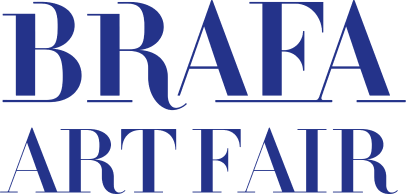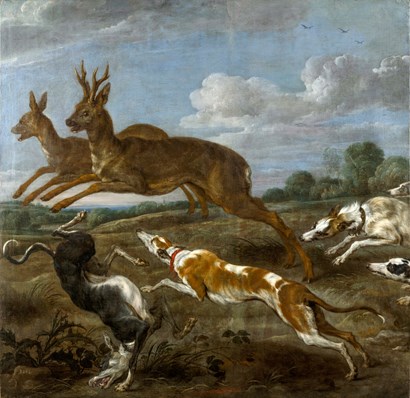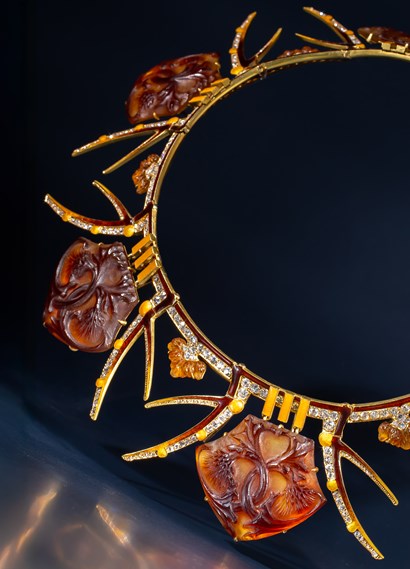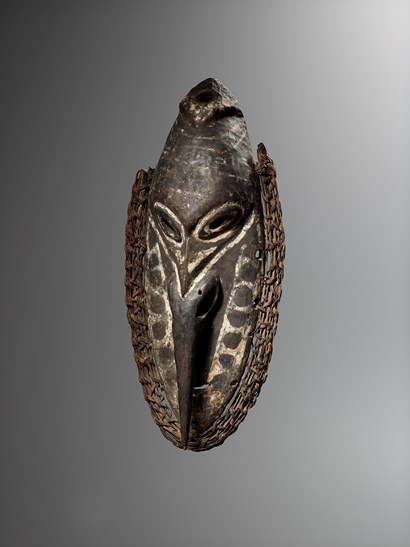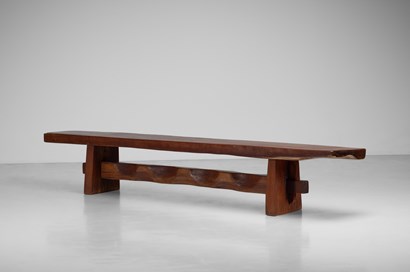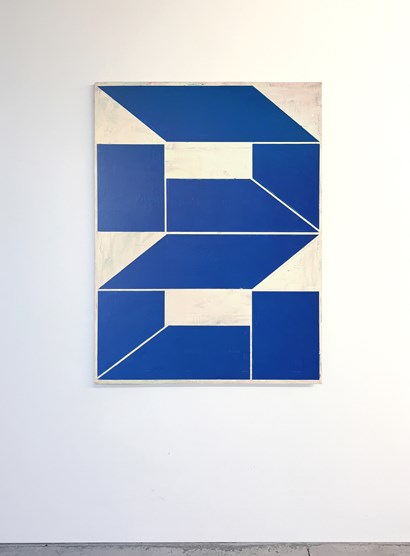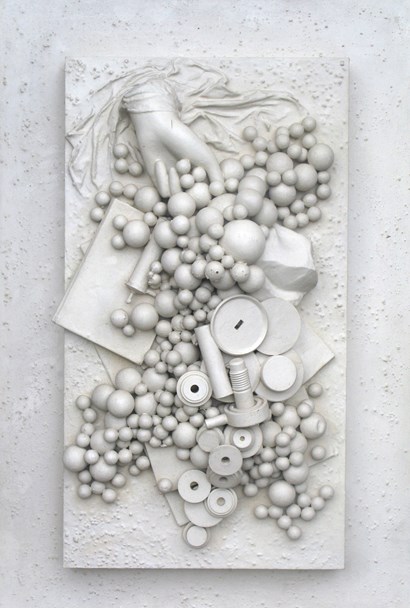This section will be available this Autumn.
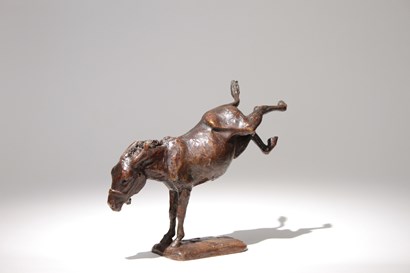
Galerie la Ménagerie
jacques froment-meurice
Jacques Froment-Meurice (Paris 1864-1946 Maisons-Lafitte) Bucking donkey, circa 1904 Model from 'Les gestes d'Ânes' Bronze A. A Hébrard foundry H 14.5 x W 18 x D 9 cm Signed on the base Provenance: collection New York, USA Literature: A strong love of all animals, but particularly of domestic breeds, especially donkeys, is evident in the character that Froment-Meurice captures in all his intimate portraits. Cast by Hebrard, they are always of the highest quality, Edward Horswell, Sculpture of Les Animaliers, 1900-1950, Scala Arts and Heritage Publishers Ltd, 2019, p. 136
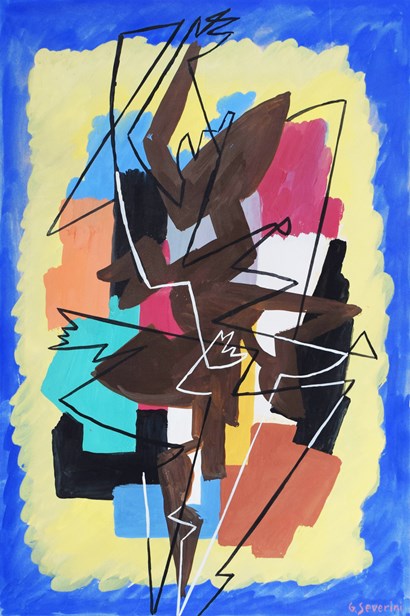
Gilden's Art Gallery
Gino Severini (Italy, Cortona 1883-1966 Paris, France) The dancer, 1959 Tempera painting on wove paper 39.5 x 28.5 cm Signed lower right 'G. Severini' and dedicated in pencil ‘al caro vecchio amico Raffaele Carrieri, affectuoso riccordi di Gino Severini’ [to a dear old friend Raffaelle Carrieri, with affectionate memories, Gino Severini] in the lower right corner The work comes with a photo-certificate of authenticity by Romana Severini Brunori dated 13 May 2025 Provenance: the celebrated poet Raffaele Carrieri (1905-1984); private collection, Milan
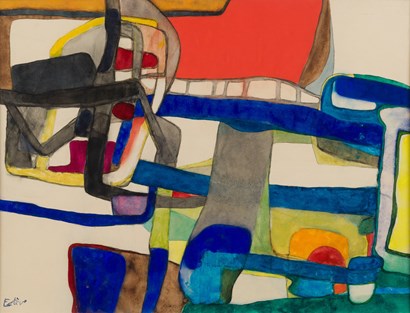
Stern Pissarro Gallery
maurice estève
Maurice Estève (Culan, 1904-2001) Untitled, circa 1953-1955 Gouache, watercolour and charcoal on paper 52.6 x 69.3 cm Signed lower left 'Estève' This work is registered in the archives of Mrs Monique Prudhomme-Estève under n° A.78 Provenance: private collection, UK This vibrant work by Maurice Estève dates from a pivotal moment in his career, when he was refining the style that would come to define his mature practice. A master of watercolor, this medium allowed him to develop a visual language characterized by subtle transparencies and rich chromatic nuances. The work features the bold colors and interlocking geometric forms that have made his oeuvre renowned, and its appealing format and quality make it a particularly attractive choice.
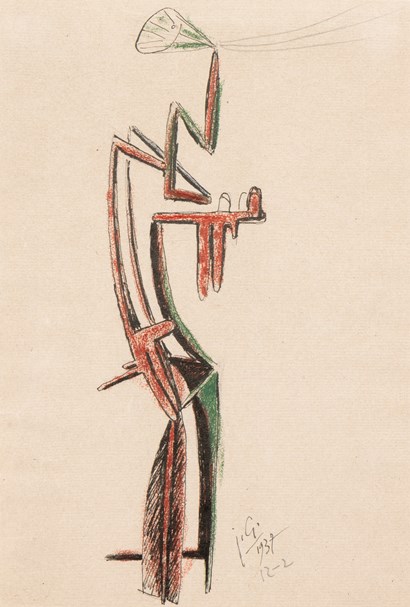
Brame & Lorenceau
julio gonzález
Julio González (Spain, Barcelona 1876-1942 Arcueil, France) Personnage au cornet, 1937 China ink and coloured pencil on paper 29 x 21 cm Signed and dated lower centre Provenance: private collection Literature: J. Gibert, Catalogue raisonné des dessins de Julio González, Projets pour sculptures personnages, Paris, 1975, vol. 9, p. 47 (ill.) Exhibition: New York, The Museum of Modern Art, Julio González, Drawings and Sculpture, February-April 1956, Minneapolis
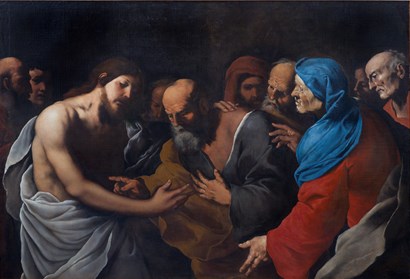
Hartford Fine Art - Lampronti Gallery
Francesco Fracanzano (Monopoli 1612-1656 Naples) The incredulity of Saint Thomas Oil on canvas 143 x 205 cm Literature: R. Causa, La pittura del Seicento a Napoli. Dal naturalismo al barocco, Naples, 1972, S. 976, n° 74; G. De Vito, Fracanziano’s periphrasis in XVII century Neapolitan studies, 2003/2004, pp. 104-105, fig. 2; N. Spinosa, XVII c. paintings in Naples, from Caravaggio to Massimo Stanzione, Naples 2010, p. 281 cat. n° 212; A. Della Ragione, Francesco Fracanzano, 2011, p. 10, fig. 23; N. Spinosa, Da Artemisia a Hackert. La collezione di un antiquario, exh. cat., Reggia di Caserta, Foligno 2019, cat. 9, pp. 18-19; N. Spinosa, Il Maestro degli Annunci ai pastori e i pittori del 'tremendo impasto' (Napoli 1625-1650), Rome 2021, cat. C5, p. 193 (quoting further literature: Cairo, 2011, pp. 203-210. Forgione, p. 233, fig. 12) Exhibition: Da Artemisia a Hackert. La collezione di un antiquario, Reggia di Caserta, 2019-2020

Univers du Bronze
roger godchaux
Roger Godchaux (Vendôme 1878-1958 Paris) Toomai des éléphants or Le Retour de chasse au tigre (1928 or earlier) Circa 1932 H 57.5 x W 70.5 x D 22.7 cm Lifetime bronze signed 'Roger Godchaux' and numbered '2/15' Old edition by 'Susse Frères Éditeurs Paris' (mark and seal), inscribed 'cire perdue'

Galerie Haesaerts-le Grelle
Gustave Serrurier-Bovy (Liège, 1858-1910) Silex linen cupboard, circa 1905 Poplar, blue stencils and blue-painted iron H 192 x W 70 x D 45 cm Provenance: Villa de L’Aube, collection of Gustave Serrurier-Bovy, Soyeur-Delvoye Literature: Jacques-Grégoire Watelet, Gustave Serrurier-Bovy, Éditions Beaunord, Paris, 1989, p. 87 Built between 1902 and 1905 on the Cointe hill in Liège, the Villa de L’Aube was the personal home of Gustave Serrurier, a true manifesto of his conception of architecture. He lived there until his death in 1910. Intended for the children’s and staff’s bedrooms, the Silex furniture was made of poplar, assembled with simple iron screws, and decorated - some of it - with painted stencils. First appearing at the Château de La Cheyrelle in 1904, Gustave Serrurier would go on to incorporate the Silex furniture into the layout of his own house. This linen cupboard was part of the original furnishings of the villa.

Virginie Devillez Fine Art
pierre-louis flouquet
Pierre-Louis Flouquet (Paris 1900-1967 Brussels) Féminités, circa 1923-1925 Oil on canvas 125 x 87 cm Signed lower right 'flouquet' Provenance: Galerie Patrick Derom, Brussels; private collection, Brussels; private collection, Brussels (by descent to the present owner) Literature: Serge Goyens de Heusch, Pierre-Louis Flouquet. 1900-1967, Brussels, Fondation pour l’Art belge, 1993, (ill. p. 56) Exhibitions: Brussels, Galerie Patrick Derom, The Avant-garde of the 1920s in Belgium, 1992, cat. n° 12 (ill.); Drogenbos, FeliXart Museum, L’Équerre / 7 Arts 1923, scenographic reconstruction of the fair stand of the publishing house L’Équerre, 2008-2011, no catalogue published Born in Paris, Pierre-Louis Flouquet was nine years old when his family moved to Brussels. Mainly self-taught, he received a brief artistic education at the Académie des Beaux-Arts in Brussels, where he met, among others, Victor Servranckx and René Magritte. The latter soon shared a studio with Flouquet, who began producing geometric works that represented a true synthesis of Cubism and Futurism. Throughout the 1920s, Flouquet exhibited frequently on the international stage - in Paris, Madrid, New York, Chicago, Buenos Aires, and Berlin, at the Galerie Der Sturm. For the gallery’s eponymous magazine, Flouquet even designed a large number of covers. During this period, he developed an art that evolved primarily through distinct series: Paysage plastique, Féminités, Composition, Formes, and Construction. The large-scale painting Féminités belongs to the series of the same name, begun in 1922, which explores geometric variations on the morphology of the female body. The rigor and purity that Flouquet infused into these anthropomorphic stylizations - further emphasized by his distinctive sense of composition - reveal his fascination with the formal perfection of the new technological creations of the modern age. Yet, in Flouquet’s work, as in that of Fernand Léger, such faith in mechanical forms does not lead to a total rejection of figuration, but rather to a search for plastic correspondences between the human and the machine. The composition Féminités is particularly harmonious, achieving a balance between line and color, enhanced by a marble-like background that lends warmth to the work.
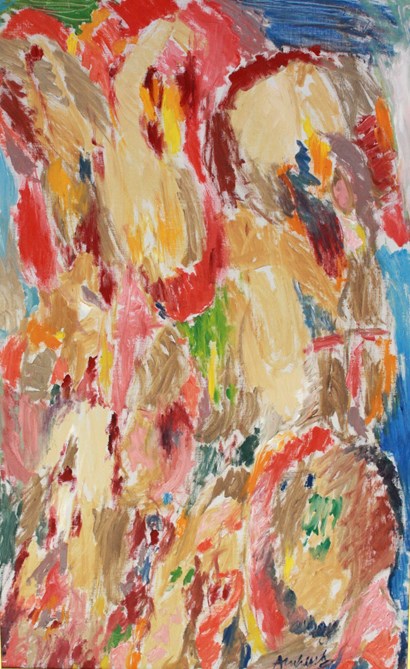
DIE GALERIE
pierre alechinsky
Pierre Alechinsky (Brussels, 1927) Le Point du Jour, 1966 Oil on canvas 130 x 81 cm Signed lower right 'Alechinsky'; signed, dated and entitled verso Certificate by the artist from 19 March 2012 Provenance: Galerie Birch, Kopenhagen; DIE GALERIE, Frankfurt am Main Literature: Pierre Alechinsky, Galerie Birch, Kopenhagen 1966; CoBrA. Una grande avanguardia europea 1948-1951, exh. cat. Fondazione Roma Museo, Palazzo Cipolla, Rome 2015, p. 211 Exhibitions: Pierre Alechinsky, Galerie Birch, Kopenhagen 1966; CoBrA international – Momente einer Utopie, Museum für aktuelle Kunst, Sammlung Hurrle, Durbach, 2012-2013; CoBrA – Una grande avanguardia europea 1948-1951, Fondazione Roma Museo, Palazzo Cipolla, Rom, 2015-2016; 70 Years of CoBrA, DIE GALERIE, Frankfurt am Main, 2018; Pierre Alechinsky and his artist friends, DIE GALERIE, Frankfurt am Main, 2025

Galeria Bessa Pereira
Sergio Rodrigues (Rio de Janeiro, 1927–2014) 'Kilin' chair, 1970s Solid wood, leather H 68 x W 68 x D 68 cm Origin: Brasil Provenance: private collection, Rio de Janeiro; Galeria Bessa Pereira collection Literature: Vicente, A., & Vasconcellos, M. (Comps.), Móvel moderno brasileiro (1st edition), São Paulo: Olhares, 2017, p. 302; Cals, S, Sergio Rodrigues, Rio de Janeiro: Icatu, 2000, p. 142
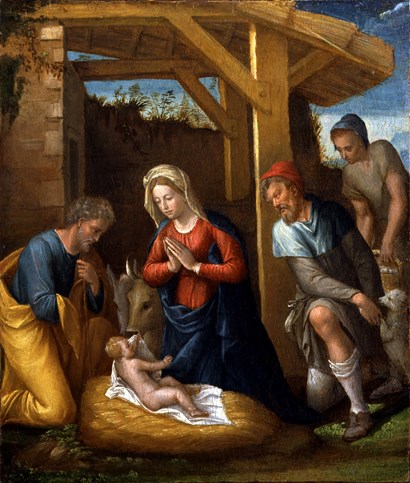
Maison D'Art
Benvenuto Tisi called Il Garofalo (Ferrara, circa 1476–1559) The Nativity, circa 1525/1540 (Adoration of the Christ Child/Adoration of the Shepherds) Oil on wooden panel 38.1 x 33 cm Literature: A. Bliznukov, Ludovico Mazzolino: catalogo delle opere, Florence (forthcoming; as Garofalo, circa 1525/1540)
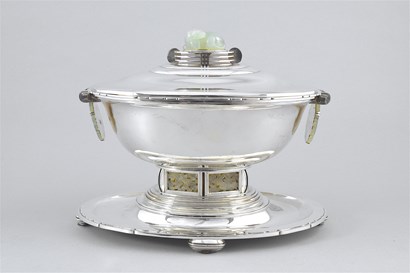
Francis Janssens van der Maelen
Silver box in jade Paris, Art Deco Sterling silver, jade W 35 cm - 4400 gr (total weight) Bears retailer's stamp, Boin-Taburet and maker's mark, Henry & Fils Boin-Taburet were formed in 1873 and quickly established themselves as one of Paris's most noteworthy makers & retailers, winning a Gold medal at the 1889 Paris Exposition Universelle. Arguably their most distinctive work married silver and silver-gilt with other materials including porcelain, marble, and in the case of this stunning Art Deco tureen, jade. Jade was seemingly a less often used material - the only other piece found with a similarly carved jade element was a box that fetched an incredible amount at auction in 2012.
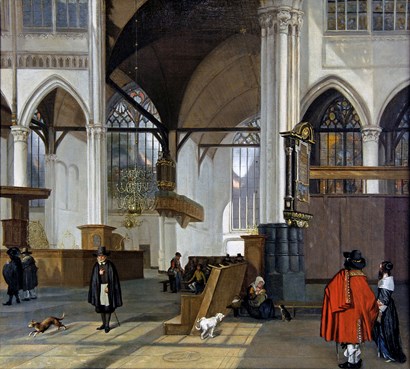
Douwes Fine Art b.v.
emanuel de witte
Emanuel de Witte (The Netherlands, Alkmaar circa 1616-1691/2 Amsterdam) Interior of the Oude Kerk in Amsterdam, the transept seen from the South Oil on canvas 64 x 71.5 cm Signed 'E. De. Witte' (c.r.) Provenance: Abraham Dijkman, Amsterdam; his deceased sale, Amsterdam, de Bosch/ Yver, 17-18 July 1794, lot 47; sale, London, Foster, 25 March 1931 (as 'unknown'); acquired at the above sale by Asscher & Welker, London; with D. Katz, Dieren; Dr. A. Welker, London, 1935; with J.D. Klaasen Jr., Rotterdam; P.M. Kerdel, Scheveningen, 1963; with Hans Cramer, The Hague by 1990; acquired by a Dutch Foundation, in 1998 Literature: Noach, 'Het Material tot de Geschiedenis der Oude kerk te Amsterdam', Amsterdam 1937, p. 81; E. Trautscholdt, in U. Thieme and F. Becker, 'Algemeines Lexikon der Bildenden Künstler' Vol. 36, Leipzig, 1947, p. 125; I. Manke, 'Emanuel de Witte', Amsterdam, 1963, p. 92, n° 62 with ill. fig. 31; F. Duparc et al., 'Masterpieces of the Dutch Golden Age', exhibition catalogue, Atlanta, 1985, p. 132-3, n° 60 with ill.; H.R. Leppien, 'In Blickfeld: Holländische Kirchenbilder', exhibition catalogue, Hamburg, 1995, pp. 56-7, 66-8, n° 20 Exhibitions: Rotterdam, Museum Boymans Van Beuningen, 'Vermeer, oorsprong en invloed Fabritius, de Hooch, de Witte, 9 July-9 October 1935, n° 116; Rotterdam, Museum Boymans Van Beuningen, Tentoonstelling van schilderijen, beeldhouwwerken en teekeningen uit particuliere verzamelingen in Nederland: onder auspiciën van de 'Stichting Museum Boymans' , December 1939-January 1940, n° 59; Atlanta, High Museum of Art, Masterpieces of the Dutch Golden Age, 24 September-10 November 1985, n° 60, p. 132-3; Hamburg, Kunsthalle, In Blickfeld: Holländische Kirchenbilder, 1995/96, n° 20
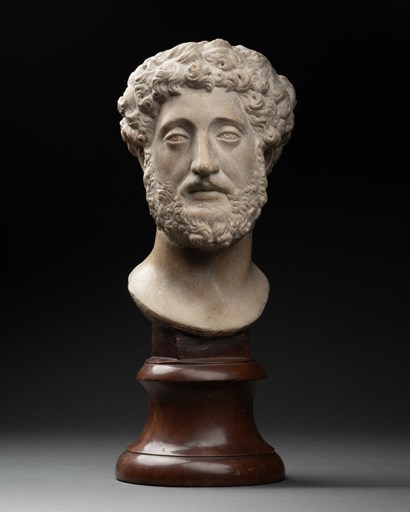
Dei Bardi Art
Marcus Aurelius (121-180 AD) Inspired by the Ancient Roman Type III bust of the Emperor Northern Italy, late 16th century Marble H 22.5 x W 16 x D 11 cm H 35 cm (with red marble base) Provenance: private collection, South of France Carved in Northern Italy in the late 16th century, this refined marble head portrays Marcus Aurelius, revered as the emblematic 'philosopher emperor'. Deliberately modeled on the ancient Roman Type III portrait created at the outset of his reign (161–180 AD), it reflects the Renaissance passion for reviving imperial imagery. Its intimate scale points to a cultivated humanist milieu - likely a private studiolo or collector’s cabinet. Responding to antiquarian collecting and humanist scholarship, the sculptor reinterprets the imperial model as an exemplum virtutis for early modern audiences. Throughout the 16th and 17th centuries, scholars and collectors, deeply engaged with ancient texts and material remains, regarded imperial portraiture as a privileged vehicle of moral exemplarity and aesthetic perfection.
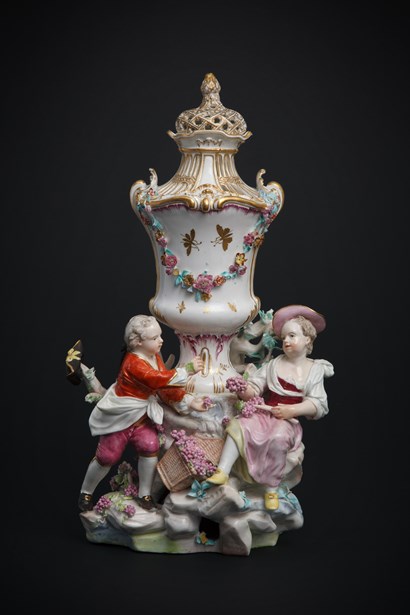
Art et Patrimoine - Laurence Lenne
Potpourri vase in polychrome porcelain Tournai porcelain, second period, 1763-1775 H 36.5 cm Rare potpourri vase in soft-paste, polychrome Tournai porcelain. At its base, it depicts a gallant offering grapes to his lady Provenance: former du Bois de Roest collection Literature: a similar piece is published in Lucien Delplace, Considérations sur les porcelaines de Tournai, p. 25, plate 3; and in Soil de Moriamé & Delplace, La Manufacture Impériale et Royale de Porcelaine de Tournay, 1937, p. 341, n° 645, plate 79
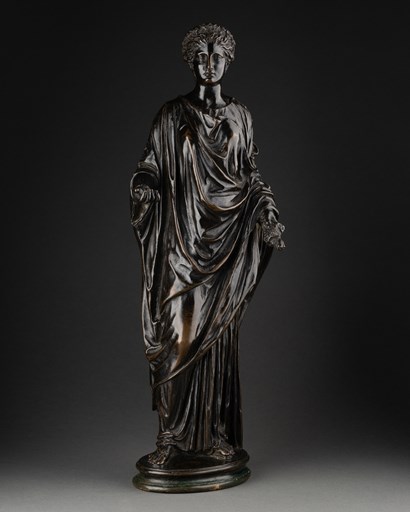
Desmet Fine Arts
giovanni & giacomo zoffoli
Giacomo (Italy, 1731-1785) & Giovanni Zoffoli (Italy, 1745-1805) Capitoline Flora, late 18th century Bronze H 34 x W 10 x D 7 cm Signed 'G.Z.F' (base) After the antique model (Capitoline Musea, Rome) Accompanied by Art Loss Register certificate: S00247973 Other versions: Victoria & Albert: Museum inv. n° A.14-1974; Saltram, National Trust, 871621.4; Philadelphia Museum of Art, Acc # 1978-70-139; Oxford, Ashmolean Museum: Acc # WA1899.CDEF.B449
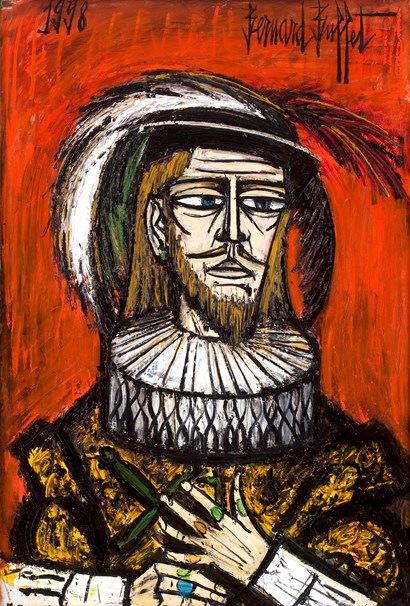
Willow Gallery
Bernard Buffet (Paris 1928-1999 Tourtour) Chevalier d'Henri III, 1998 Oil on canvas 130 x 89 cm Signed and dated This painting is sold with a photo-certificate of authenticity from the Galerie Maurice Garnier, Paris Provenance: Galerie Maurice Garnier, Paris; private collection, Germany (acquired from the above 2000); sale, Christie's London, 21 June 2012; private collection, Hong Kong Literature: Y. Le Pichon & M. Garnier, Bernard Buffet, 1982-1999, vol. III, 2007, Switzerland, n° 1261 (ill. p. 552)

Galerie Cento Anni
andré lanskoy
André Lanskoy (Moscow 1903-1976 Paris) Un cas suspect, 1964 Oil on canvas 97 x 146 cm Signed and dated 'Lanskoy 64' Provenance: Galerie de Seine; private collection, Paris Certificate of authenticity from the Comité Lanskoy dated 4 April 2025 This work will be included in the forthcoming catalogue raisonné currently in preparation

Galerie Boulakia
jean dubuffet
Jean Dubuffet (Le Havre 1901-1985 Paris) Lampe et Balance 1, 1964 Oil on canvas 97 x 130 cm Signed and dated bottom centre; signed, titled and dated 'juillet 64' on reverse Provenance: Dr. Jacqueline Porret-Forel, Paris (gift from the artist in 1966); collection in the United Arab Emirates; European collection Literature: Max Loreau, Catalogue des travaux de Jean Dubuffet, Fascicule XX: L'Hourloupe I, Paris, 1966, cat. no. 367 (ill. p. 168). Exhibition: Jean Dubuffet, Galerie Georges Moss, Geneva, Nov. 1969-Jan. 1970, cat. n° 8

